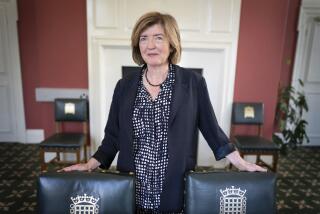Popular No. 2 Official in Hong Kong Reportedly Resigns
- Share via
HONG KONG — Anson Chan, one of Hong Kong’s most respected political figures and an articulate defender of democracy, has resigned from her post as the territory’s chief secretary, government sources said today.
Chan and other senior officials in the Hong Kong government declined immediate comment on a flurry of news reports, but a government official who spoke on condition of anonymity said a formal announcement of her resignation would be made later in the day.
As the Chinese territory’s senior civil servant, Chan, 60, is not technically a politician, but she holds the No. 2 post in the government. Because Hong Kong Chief Executive Tung Chee-hwa is, in effect, chosen by Beijing, her standing and legitimacy are far higher than is the case for most career civil servants in the territory, which returned to Chinese rule in July 1997.
At one point, she had reportedly hoped to succeed Tung, and some observers believe that her resignation could be interpreted as a move to position herself for a challenge when Tung’s term expires next year.
“If she wants to do that, the timing of her resignation is perfect,” said Michael DeGolyer, a political scientist at Hong Kong Baptist University. “She has a year of unused leave and would then be free of any restraints [as a civil servant] just about the time campaigning would begin.”
However, the government official said her departure would be cast as a retirement.
Chan’s apparent resignation--18 months before her term is due to expire--comes after highly publicized personal criticism from Beijing, which accused her of less than wholehearted support for Tung.
Polls have given Chan, one of the civil servants closest to the last British governor of Hong Kong, Chris Patten, positive performance ratings of 60% to 70%. Tung’s approval ratings are in the low 30s.
Tung, a former shipping tycoon whose political skills have drawn criticism, has taken a consistent pounding from the local media. The Beijing leadership has made little secret of its belief that Chan is at least partly responsible.
Within half an hour of her meeting in Beijing with Chinese Vice Premier Qian Qichen in September, the official New China News Agency issued a report saying that Chan had been told to “better support the work of the chief executive.”
While Tung’s comments on such issues as press freedom often come across as halfhearted, Chan has consistently been a strong backer of democratic values.
Her remarks last year to a meeting of the Freedom Forum, an independently funded foundation dedicated to freedom of expression, were typical of her stance on the issue.
“You have to accept it [a free press] warts and all,” she said. “You can’t have a virtually free press, or a more or less free press. That’s like being a little bit pregnant.”
If she has decided to step down, it could stem from her realization that Beijing is likely to back Tung for a second five-year term beginning next year, and that he would be given greater power to go outside the civil service in picking his Cabinet.
Overriding a de facto nomination from Beijing would be difficult, though not impossible, because the next chief executive will be chosen by a committee of 800 leading Hong Kong residents.
Chan is expected to be replaced by Hong Kong’s finance secretary, Donald Tsang.
More to Read
Sign up for Essential California
The most important California stories and recommendations in your inbox every morning.
You may occasionally receive promotional content from the Los Angeles Times.













